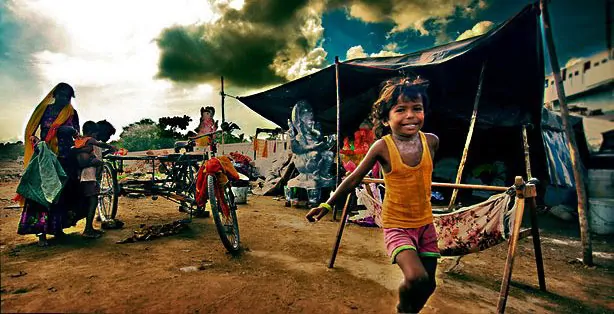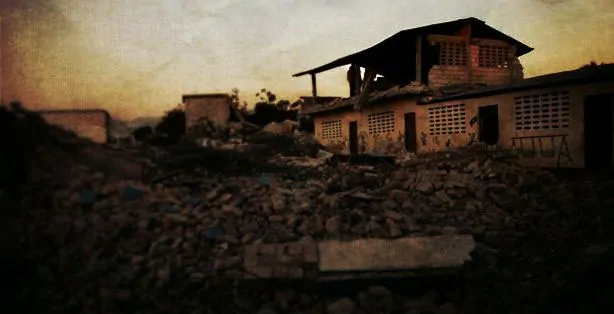
No one rejoiced on the day Ratna was born. Her father grunted in disgust and turned away. A girl! Another financial burden he would have to bear, and then he would be required to pay a huge dowry to get her married. He wanted to take her to the river, throw her in, and rid the family of the curse. Ratna’s mother kept quiet. She couldn’t help but wonder if it might not be better to let her husband have his way than to condemn her baby daughter to grow up a poor Dalit, forever indebted to a landowner. It was Ratna’s grandmother, her father’s mother, who said, “No, let the baby live. We need someone to clean the house and care for the sons you will have.”
So Ratna lived to work and go hungry, to work and be given in marriage to an old man who did not require much of a dowry, to work and bear children, to work, and work, and work.
But Ratna also lived to see change. When her husband died, she was not forced into the streets to beg. She had learned to read and write in classes the Vijayams taught, and she was able to get a loan to grow mango trees specially developed at PROGRESS (Peoples Research Organization for Grass Root Environmental Scientific Services) for fast growth, high yield, and easy picking. She built a business and created jobs for other women who picked the fruit and carried it to the market. Her children went to school, and she found a good husband for her daughter.
Who could have known? Ratna, who was almost drowned the day she was born, lived to see her generation changing.
Empowerment
When the women of one village applied for a loan to buy two water buffaloes, they had a plan: all the village women would own the animals together. After working in the fields all day, the women would take turns cutting grass along the side of the road in the evening and carrying it on their head to the buffalo enclosure the men had worked together to build. Great plan, but unfortunately problems quickly arose. Higher-caste people who lived on the other side of the village complained, saying, “The roads are in our area of the village, so that grass belongs to us!”
None of the women owned land. They did, however, have hungry buffaloes that needed to be fed. So they turned to the only other source of fodder they knew—the grass that grew alongside the landlords’ fields. That worked for a short time. But as soon as the landlords saw what the women were doing, they, too, ordered them to stop: “You are not permitted to take anything that grows near our fields!”
Without grass, the two buffaloes would starve. On the other hand, without laborers to pick the crops, the landlords’ fields would not be harvested. So the wise village laborers said, “As long as we are not allowed to cut the grass on the road beside your fields for our buffaloes, we will not do any work in your fields.”
True to their word, not one worker went to the fields to work that day. Again the next day, no workers. The landlords looked at their fields, ripe and ready to be harvested, and fear rose within them. When no workers came on the third day, the panicked landlords exclaimed: “All right! Help yourself to the grass on the road. In fact, go ahead and glean from the fields as well. Take whatever you need. But, please, just come back to work!”
Basic Rights
Access to water is an ever-present concern throughout India. In one drought-prone region, the government had established a well on each side of one village to make certain no one in the area lacked water. The first well was located in the mostly high caste area, while the other was in the poor, Dalit section. When the well in the Dalit area dried up, a Dalit boy carried his water jug to the first well and began to draw water. Immediately, a group of high caste people rushed over and shoved him away. “How
dare you draw water from our well!” they demanded. When the boy tried to go back to get his water jar, the high caste villagers grabbed sticks and beat him away. In terror, the little boy ran off.
The high caste villagers figured that would end the matter. In the past, thirsty Dalits had always scrounged the ditches for water. Why should this time be different?
But this time was different. Peacefully but firmly, the Dalits went together to their government official and presented the situation. Because they were united as a group, and because the law was on their side, the officials had no choice but to listen. Today, both wells are completely accessible to everyone in the village, regardless of caste.
Power through Unity
In another village a group of higher caste men armed with clubs blocked a bullock cart carrying four Dalit teenagers. The men pulled one boy out of the cart and beat him. “That’s what you get for stealing from our house!” they cried as they hit him again and again.
The next day, when the council called a meeting to address the matter, nearly 100 people from several villages showed up to express their outrage. “Those men have no right to decide whether that boy is innocent or guilty,” they protested. “It is a matter for the police to determine, not them!”
Then, as a group, they headed for the police station. “Those men tied up the boy and beat him, although there is no reason to think he is guilty of anything,” the head of the sangham (fellowship) stated. “We insist that you arrest them.”
The police officers looked at each other. Arrest high caste people of power? Just because they beat a Dalit boy? The policemen shrugged and went back to work. But the Dalit spokesman insisted: “If you are not going to arrest them, we will go to your
superior. You are not upholding the law. We insist you do your duty.”
When it became apparent that 100 villagers who knew their rights were not going to give up until justice was done, the police were forced to arrest the aggressors and take them to a court of law. There they were found guilty and punished.
“We used to be barred from the government,” one woman said in wonder. “But now our voices are heard. We go to the police for justice, and they do not shut us out. They say, ‘Come! We want to help you!’”
Continuing On
There is still a long way to go in this process. The wealthy are used to having things their own way, and they will not easily relinquish their positions of power. But a generation changing means that a generation is learning to make its own way.
Taken from In the Presence of the Poor: Changing the Face of India. Copyright © 2008 by Kay Marshall Strom. Used by permission of Authentic Publishing.





















